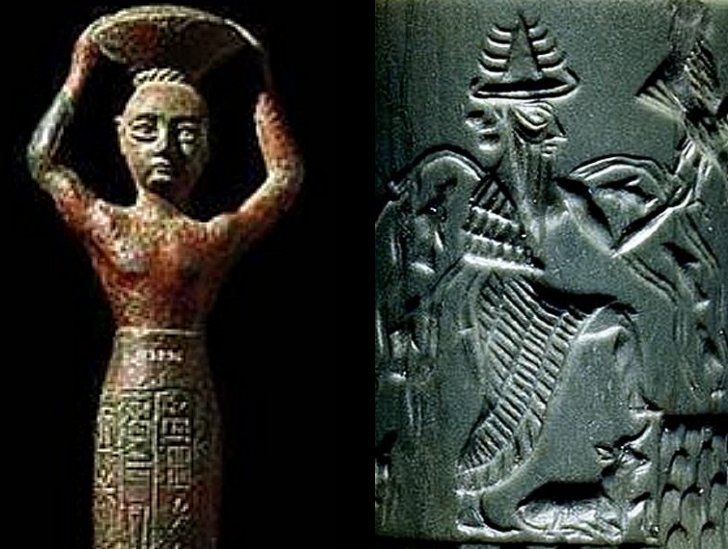Nammu: Sumerian Goddess Who Got The Idea To Create Mankind In The Image Of Gods
A. Sutherland - AncientPages.com - In Sumerian mythology, Nammu (Namma) was the "primeval sea" - the ultimate origin of everything.
The goddess Nammu gave birth to the heavens and the earth and life to the first couple of gods.
More exactly, she gave birth to the male sky god, An, and the female earth goddess, Ki, whose union, in turn, produced the god Enlil (Air), source of the ordered universe, responsible for cattle, agriculture tools, vegetation, and the arts of civilization. Man was created to serve the gods and provide them with nourishment.
Nammu /Namma), a primeval goddess, who gave birth to An (heaven) and Ki (earth) and the first gods; Right: Enki god of the god of wisdom, creator, protector of humanity and the patron of craftsmen and artisans.
Nammu represented the oldest generation of Mesopotamia’s deities and was the mother of the god Enki (Ea), the Sumerian water god of Eridu, located in the southern wetlands of what is today Iraq. Enki was also the god of wisdom, creator, protector of humanity, and patron of craftsmen and artisans.
Not much is known about the Eridu goddess, Nammu, but she may have been a much more important prehistoric deity in the times before her son Enki took over most of her tasks.
Enki’s birth as the son of the goddess Nammu is attested in the Neo-Sumerian mythological text entitled “Enki and Ninmah.” It is said that Nammu got the idea to create mankind in the image of gods; however, to do this, she had to consult her son Enki, who gave his mother instructions on how to fashion man.
Samuel Noah Kramer, Assyriologist and a world-renowned expert in Sumerian history, writes that the poem begins with what may be a description of the difficulties of the gods in procuring their bread, especially after the female deities had come into being.
The gods complain, but Enki, the water god— as the Sumerian god of wisdom who is expected to come to their aid—is lying asleep in the deep and fails to hear them.
Enki gives the matter thought, leads forth the host of "good and princely fashioners," and says to his mother, Nammu, the primeval sea:
"O my mother, the creature whose name you uttered, it exists,
Bind upon it the image of the gods;
Mix the heart of the clay that is over the abyss,
The good and princely fashioners will thicken the clay..."
In the Sumerian poem “Enki and Ninmah,” Nammu’s role in Mesopotamian cosmology is particularly emphasized. Still later, however, in other texts such as the Akkadian ones, Nammu lost her importance, being only mentioned infrequently. In a later myth of Sumer, she became known as Tiamat.
The Mesopotamian scribes depicted and described Nammu as a goddess without a husband, the self-procreating womb of the universe. No male divine deity in connection with Nammu was ever mentioned in ancient Mesopotamian sources.
This led to the belief that the first cosmic production was asexual, according to the Sumerian creation myth.
Very little historical information can attest to cult places for the goddess Nammu, representing the oldest generation of Mesopotamian deities.
Her latest reference dates to the Neo-Babylonian period, when King Nabonidus (556 until 539 BC), the last king of Babylonia, mentioned Nammu’s shrine as part of the Esagil, known as the temple constructed to honor Marduk, the protector god of Babylon and located south of the ziggurat Etemenanki.
Updated on January 26, 2024
Written by – A. Sutherland - AncientPages.com Senior Staff Writer
Copyright © AncientPages.com All rights reserved. This material may not be published, broadcast, rewritten or redistributed in whole or part without the express written permission of AncientPages.com
Expand for referencesReferences:
Kramer N. Samuel, History Begins At Sumer
Leick G. A dictionary of ancient Near Eastern mythology
More From Ancient Pages
-
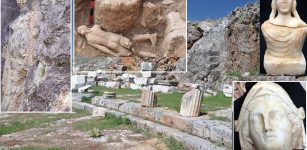 Sculptures Of Kybele, Athena, Hekate, Apollo Unearthed At Hellenistic Site Of Pisidia Antiocheia, Turkey
Archaeology | Oct 15, 2017
Sculptures Of Kybele, Athena, Hekate, Apollo Unearthed At Hellenistic Site Of Pisidia Antiocheia, Turkey
Archaeology | Oct 15, 2017 -
 Puzzling Case Of An Ancient French Giant Whose Bones Caused Sensation And Controversy
Featured Stories | Jan 22, 2019
Puzzling Case Of An Ancient French Giant Whose Bones Caused Sensation And Controversy
Featured Stories | Jan 22, 2019 -
 God Ptah ‘Lord Of Memphis’ Was Among The Most Revered Creator Gods Of Ancient Egypt
Egyptian Mythology | Apr 17, 2018
God Ptah ‘Lord Of Memphis’ Was Among The Most Revered Creator Gods Of Ancient Egypt
Egyptian Mythology | Apr 17, 2018 -
 Face Of A Greek Girl That Lived 9,000-Years Ago Reconstructed In Athens
Archaeology | Jan 27, 2018
Face Of A Greek Girl That Lived 9,000-Years Ago Reconstructed In Athens
Archaeology | Jan 27, 2018 -
 Last Homo Erectus Lived 117,000 Years Ago At Ngandong
Archaeology | Dec 19, 2019
Last Homo Erectus Lived 117,000 Years Ago At Ngandong
Archaeology | Dec 19, 2019 -
 Draupnir: God Odin’s Magical Ring That Could Multiply Itself
Featured Stories | Jul 26, 2017
Draupnir: God Odin’s Magical Ring That Could Multiply Itself
Featured Stories | Jul 26, 2017 -
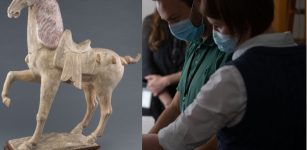 1,300-Year-Old Art Mystery Solved By Scientist
Archaeology | Sep 7, 2022
1,300-Year-Old Art Mystery Solved By Scientist
Archaeology | Sep 7, 2022 -
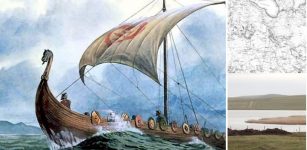 Long-Lost Viking Waterway Leading To Orkney, The Great Norse Empire – Discovered
Archaeology | Aug 5, 2020
Long-Lost Viking Waterway Leading To Orkney, The Great Norse Empire – Discovered
Archaeology | Aug 5, 2020 -
 On This Day In History: Grote Reber, Great Amateur Astronomer And Ham Radio Operator Born – On Dec 22, 1911
News | Dec 22, 2016
On This Day In History: Grote Reber, Great Amateur Astronomer And Ham Radio Operator Born – On Dec 22, 1911
News | Dec 22, 2016 -
 Heuneburg Early Celts’ Settlement: Wine Was Available To All Residents Not Only To Elite
Archaeology | Oct 25, 2019
Heuneburg Early Celts’ Settlement: Wine Was Available To All Residents Not Only To Elite
Archaeology | Oct 25, 2019 -
 Ancient Germanic Ghost Warriors – Romans’ Greatest Military Defeat And Nightmare
Featured Stories | Feb 18, 2019
Ancient Germanic Ghost Warriors – Romans’ Greatest Military Defeat And Nightmare
Featured Stories | Feb 18, 2019 -
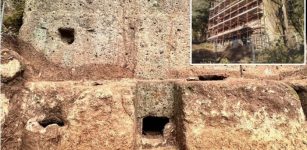 Who Is Buried In The Giant Etruscan Tomb At San Giuliano Necropolis?
Archaeology | Mar 13, 2024
Who Is Buried In The Giant Etruscan Tomb At San Giuliano Necropolis?
Archaeology | Mar 13, 2024 -
 Ranikot Fort: Gigantic Great Wall Of Pakistan Shows Greatness Of Indus Valley Civilization
Featured Stories | Mar 27, 2019
Ranikot Fort: Gigantic Great Wall Of Pakistan Shows Greatness Of Indus Valley Civilization
Featured Stories | Mar 27, 2019 -
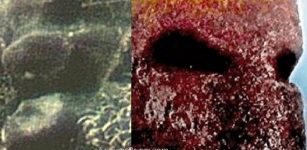 Prehistoric Puzzle: Three Gigantic Stone Heads Of Unknown Origin
Featured Stories | Mar 17, 2020
Prehistoric Puzzle: Three Gigantic Stone Heads Of Unknown Origin
Featured Stories | Mar 17, 2020 -
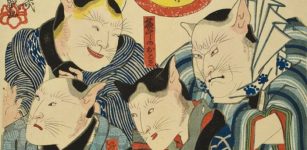 Why Were Actors Painted As Cats By Ukiyo-e Artists In Japan?
Ancient History Facts | Feb 11, 2020
Why Were Actors Painted As Cats By Ukiyo-e Artists In Japan?
Ancient History Facts | Feb 11, 2020 -
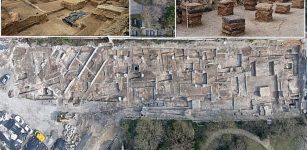 A Huge Site Dated To Roman-Era Unearthed In Reims (Marne), France
Archaeology | Mar 20, 2023
A Huge Site Dated To Roman-Era Unearthed In Reims (Marne), France
Archaeology | Mar 20, 2023 -
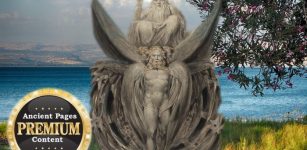 Mysterious Otherworldly Creatures Witnessed By Biblical Prophet – What Happened?
Biblical Mysteries | Jun 30, 2020
Mysterious Otherworldly Creatures Witnessed By Biblical Prophet – What Happened?
Biblical Mysteries | Jun 30, 2020 -
 Chocolate Was A ‘Hot Property’ In 17th Century England And There Were Rules For Safe Consumption
Featured Stories | Jun 27, 2018
Chocolate Was A ‘Hot Property’ In 17th Century England And There Were Rules For Safe Consumption
Featured Stories | Jun 27, 2018 -
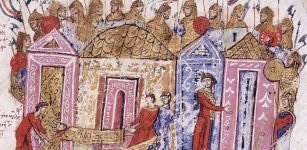 Nova Anglia: The Anglo-Saxon New England In The East
Featured Stories | Jun 13, 2022
Nova Anglia: The Anglo-Saxon New England In The East
Featured Stories | Jun 13, 2022 -
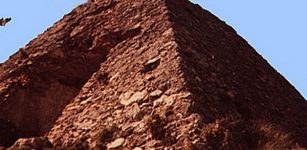 Mysterious Ancient Falicon Pyramid And Its Complex Obscure History
Featured Stories | Nov 28, 2018
Mysterious Ancient Falicon Pyramid And Its Complex Obscure History
Featured Stories | Nov 28, 2018

